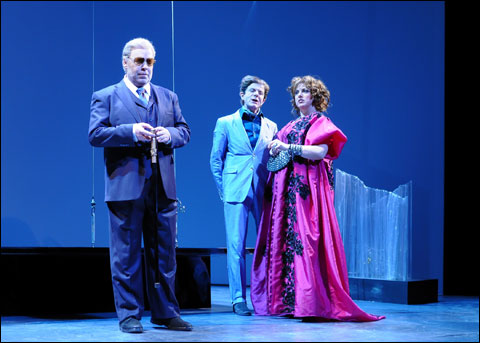
CURTAIN CALL Opera Boston is the latest in a long and distinguished line of failed opera companies in Boston. Despite productions like this past year's Cardillac, above, it closes next week after a final performance at First Night.
Over the past century, Boston has occasionally
been a world center for great opera. But Boston
has had a hard time supporting its opera companies. The legendary Boston Opera
Company lasted only from 1909 to 1915, and the Opera House was finally torn
down, unused, in 1958. Neither Sarah Caldwell's brilliantly erratic Opera
Company of Boston
nor Peter Sellars's Boston Opera Theater (shuttered after one hit production)
have survived. Now Opera Boston, Boston's
second-largest opera company - Boston's Avis - has announced that it's closing shop on
January 1.
Starting life in 1980 as the Boston Academy of Music, an
estimable alternative company under the direction of singer/director Richard
Conrad, it became Opera Boston in 2002, when the board of directors dismissed
Conrad. This year, Lesley Koenig, "assistant manager and director of
production" at the Met (she may be the only stage director with an MBA),
took over as general director. Its artistic director has been Gil Rose, who is
also music director of the Boston Modern Orchestra Project. Between 2003 and
2006, Rose directed the exciting collaboration between Opera Boston and BMOP
known as Opera Unlimited, presenting an outstanding series of operas by such
notable contemporary composers as John Harbison, Thomas Adès, and Peter Eötvös
(specifically, his ambitious operatization of Angels in America).
Opera Boston has had a distinguished if inevitably
uneven history. Its productions have not always lived up to the promise of its
extraordinarily varied and exploratory selections of operas, but a handful of
its productions (all conducted by Rose) - among them
Kurt Weill's Rise and
Fall of the City of Mahagonny,
Offenbach's La
Grande-Duchesse de Gérolstein (a
brilliant star vehicle for mezzo-soprano Stephanie Blythe), the first Boston
revival of John Adams's Nixon in
China, and most exciting of all,
its breathlessly inspired version of Shostakovich's The Nose,
among notable revivals of overlooked bel canto operas - have given Boston some of its most memorable operatic experiences
since the glory days of Caldwell and Sellars. Others might also add Osvaldo
Golijov's Lorca opera, Ainadamar (with Dawn Upshaw), and the world premiere of
Zhou Long's Madame
White Snake, which won the 2011
Pulitzer Prize for music.
The brief announcement from the company cites "an
insurmountable budget deficit" and "lackluster fundraising in a tough
economic climate," and has sent shockwaves of disappointment through the
entire arts community.
Still, one of the driving forces of Opera Boston, artistic
advisor, season sponsor, and co-founder Randolph J. Fuller, president emeritus
of the board of directors, assures me that he is "far from finished with
opera in this city, and neither is our remaining board. Something new and
exciting will re-emerge. So have faith and stay tuned."
Opera Boston's
final performance will be a First Night presentation of Mozart's Bastien und
Bastienne, featuring some of the company's younger singers, on December 31.
















